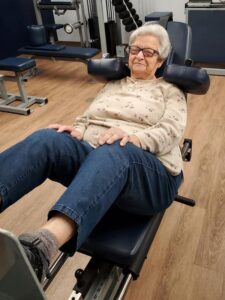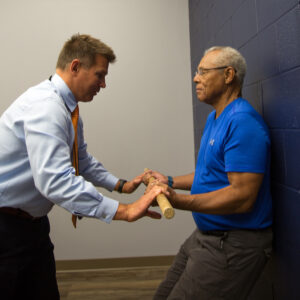Stop Using Age as An Excuse
“The average person starts losing muscle at about age 25.” I’ve used that statement many times to convince people they need to lift weights. I’m not sure where I first heard this statistic, but today I stumbled across the supporting research. A 1988 study published in the Journal of Neurological Sciences examined autopsied back muscles of 43 previously healthy men between 15 and 83 years of age. The results showed age-related muscle atrophy begins around age 25.
When the average person reaches 60, muscle loss significantly speeds up. This age-related acceleration of muscle loss, known as sarcopenia, will cause most of us to lose 40 percent of our muscle mass by age 80.
At the same time, most of us gain one to two pounds per year from our mid-20s to our mid-50s. That weight gain certainly isn’t muscle. This combination of added fat and lost muscle makes it difficult for many of us to function well into our 50s and beyond.

Most of us will start to see some weight loss in our mid 50s. But don’t get too excited about that. Weight loss beyond age 50 typically occurs because we stop gaining fat and muscle loss starts to accelerate.
About one-third of adults over age 65 have trouble getting from point A to point B. When you add in the fact that 30 percent of us will get diabetes by age 65, it’s a miracle that any of us can function beyond age 70. In fact, most of us don’t function in a healthy state beyond age 63.
One of the reasons we lose muscle as we age is the connection between the brain and our muscle cells can deteriorate over time. Neurons that descend from the brain to the spinal cord communicate with and control our muscles. With age, our bodies lose some of those connections, leading to muscle loss.
It doesn’t have to be this way. Strength training can slow the aging process, keep us moving and prevent us from getting too fat. A study published this summer at the University of Copenhagen sheds some light on one of the ways lifting weights can slow the aging process. The study found that lifting weights can help strengthen the connections between nerves and muscles, even in our 70s, 80s, and beyond.
The study involved 38 healthy men with an average age of 72. They took part in a 16-week course of intense strength training. These older men were able to increase the strength and size of their muscles, despite their age. But, more impressively, they were able to restore previously lost connections between the nervous system and the muscles.
The men in this study made these changes at an age when most of us give up on improving our health. Don’t give up. More importantly, no matter your age, start strength training on a regular basis—now. And once you start, never quit.

In 2014, we did a Client Spotlight on Milton Flowers. At the time of the story, this 72-year-old ski instructor came to us because he wanted to continue to dominate the slopes when skiing with his buddies who were 20 years younger and worked out five days a week. By training with us 20 Minutes A Week, he built the strength and stamina he needed to beat his younger friends on the ski slopes.
A couple of weeks ago, I ran into Milton at our Avon gym. At age 80, he still trains with us 20 Minutes A Week to stay strong for his job on ski patrol at Perfect North Slopes. He offered to give me some lessons this winter. The man is 80 and still doing what he loves because, at age 72, he decided to do something to make himself stronger and improve his stamina.
Studies continue to reveal to us the positive effects strength training has on our aging bodies. A study conducted at the University of Eastern Finland found that greater muscle strength is associated with better cognitive function in folks in their mid-60s. Another study found that maintaining leg strength as we get older is critical to keeping our brains and nervous systems healthy. Studies have also proven strength training slows the progression of multiple sclerosis, prevents dementia, and prevents cardiovascular disease. No need to search the world for the fountain of youth—turns out, you just need to build your muscles.
A couple of weeks ago, Chris Oliger made a Facebook post about his 91-year-old client who came to Exercise Inc for her 20-minute workout on her birthday. I hope she’s training with us when she’s 100.
The first research I mentioned in this article stated that the earlier you start strength training, the better your chances of slowing down the aging process. That’s true. But the benefits can happen at any age. Whether you’re 31 or 91, you need to strength train once a week. And if you start at 91, you may make it to 101.
Stay Strong,
Bo Railey

